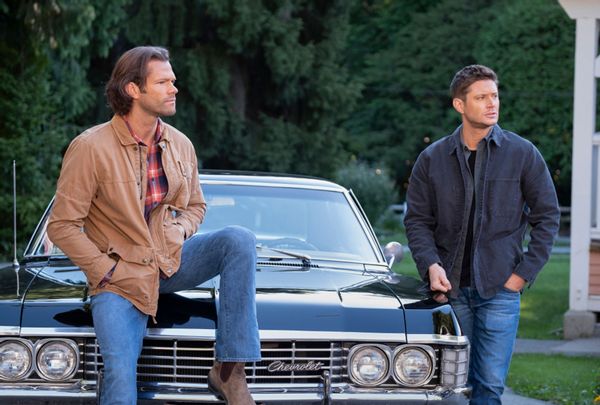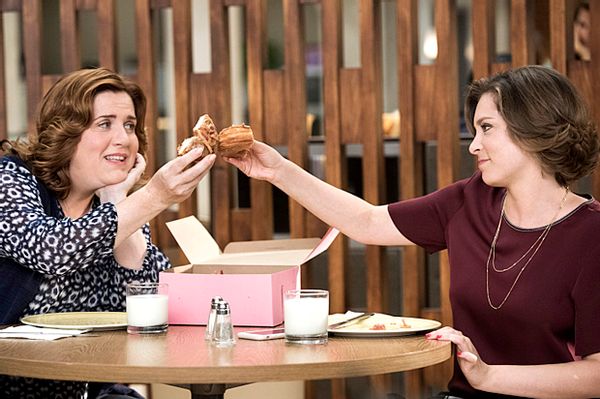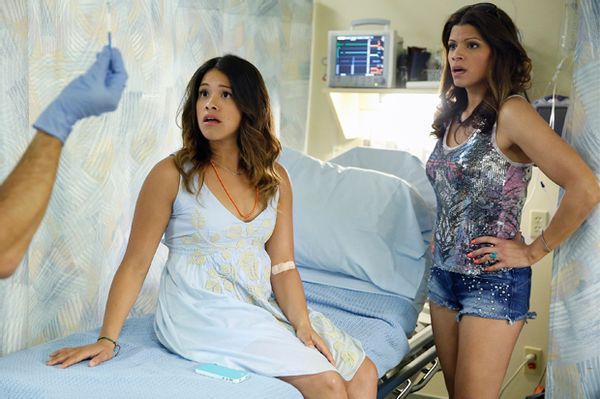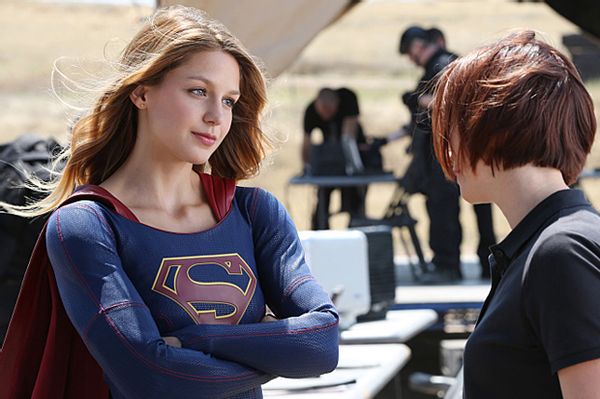
Since its formation in 2006 as a joint venture between then-corporate owners CBS and Warner Bros., The CW has been regarded as the little brother of broadcast TV, always chasing the likes of CBS, ABC, NBC, and even Fox in not only the ratings but often in terms of quality, too. But under the guiding hand of President-turned-CEO Mark Pedowitz, who dared to defy all preconceived notions of what the network could or should be during his tenure from 2011 until his departure in October 2022, The CW was transformed from a network aimed primarily at teens and young women into a destination for sometimes risky, often groundbreaking TV that appealed to all audiences.
The truth is, it's been slowly fading in relevancy for a few years.
From long-running genre series like "Supernatural" and "Arrow" to award-winning comedies like "Jane the Virgin" and "Crazy Ex-Girlfriend," The CW has been home to several shows with real, lasting cultural impact. With the news that Pedowitz is leaving the network he helped transform upon Nexstar Media Group acquiring a controlling interest in it, the future of The CW is, at best, uncertain. But the truth is, it's been slowly fading in relevancy for a few years, in part due to a recent sense of complacency, but also because of the changing nature of the streaming landscape that once propped it up.
When The WB – the home of iconic teen dramas like "Buffy the Vampire Slayer" and "Dawson's Creek" – and UPN, the network behind fan-favorite series like "Veronica Mars" and "Girlfriends," merged to form The CW, there wasn't a clear path forward. The schedules those first few years were pieced together from the former networks' existing programming slates, with beloved shows like "Gilmore Girls," "Smallville," "One Tree Hill" and "Everybody Hates Chris" serving as the foundation.

The CW was more than capable of punching above its weight.
At the time of the network's creation, few likely saw "Supernatural," then a fledging supernatural-horror series starring a floppy-haired former love interest from "Gilmore Girls" and a devilishly handsome one-time villain from "Smallville," as anything more than a seat warmer. That it would skirt cancellation at every turn and run for 15 seasons to become TV's longest-running live-action fantasy series still feels a bit surreal, especially in light of the realization that, for a time, the show was airing alongside more light-hearted or melodramatic series like "Gossip Girl" (2007), "90210," (2008), and "Privileged" (2009). Of course, that didn't last long.
In 2009, Kevin Williamson and Julie Plec's supernatural drama "The Vampire Diaries" debuted, kicking off a period of transition for the network. Although some viewed it as merely The CW's attempt to capitalize on the popularity of "Twilight," the show was revealed to be deeper and have a richer narrative. With a two-pronged approach to storytelling — mixing slow-burning character arcs with fast-paced, life-or-death drama — the series blew through plot faster than any show in recent memory, proving The CW was more than capable of punching above its weight. Simultaneously emotionally devastating and decidedly romantic, it slowly started altering the public's impression of the network. And yet, it really wasn't until 2012, under the guidance of Pedowitz — who had taken over from original President of Entertainment Dawn Ostroff in 2011 — that the DC Comics series "Arrow" would join the schedule and truly begin to change the trajectory and reputation of the network, eventually drawing a more balanced audience and proving that there was more to The CW than most assumed.

With several original musical numbers featured in each episode and powerhouse performances from every member of the cast, ["Crazy Ex-Girlfriend"] was like little else on TV, before or since.
With Pedowitz at the helm, the network became known not just for the comic book-inspired Arrowverse — an extended universe not unlike the one Kevin Feige had developed and produced on the big screen for Marvel beginning in 2008 — but for taking risks on programs other networks wouldn't. The brilliant and hilarious musical comedy "Crazy Ex-Girlfriend," co-created by star Rachel Bloom and Aline Brosh McKenna in 2015, was developed for Showtime before ending up on the broadcast network (both were owned by what was then CBS Corporation), where it was low-rated but critically beloved for the way it used comedy and musical theater to speak to the importance of prioritizing mental health, all through its antiheroine's nuanced personal journey. With several original musical numbers featured in each episode and powerhouse performances from every member of the cast, the series was like little else on TV, before or since.
Along with "Jane the Virgin," which debuted in 2014 and starred Gina Rodriguez in her breakout role as a virgin who's accidentally artificially inseminated, "Crazy Ex-Girlfriend" is one of two CW shows to earn significant accolades. The latter is an Emmy winner for Outstanding Music and Lyrics, while Bloom and Rodriguez snagged Golden Globes for their respective performances. As much as we must question the Globes and motives of the Hollywood Foreign Press Association now, these awards meant a great deal to The CW, as they validated its efforts to find new talent and tell unique, meaningful stories. But recognition came elsewhere, too. Following its first season, "Jane" took home a prestigious Peabody Award for embracing its telenovela roots and telling not just swoon-worthy love stories or soapy melodramatic tales of murder and mystery, but also moving contemplations on motherhood, family, and second chances. It also refused to shy away from more difficult-to-talk-about topics like religion, class and immigration. Rarely has a show done so much in 42 minutes.

But even when the network returned to basics, like with charming female-driven series like "Hart of Dixie" or the '80s-set "Sex and the City" prequel "The Carrie Diaries," there was a warmth that drew viewers in and made them want to stay. The former series, a fish-out-of-water story about a New York doctor (Rachel Bilson) moving to small-town Alabama, was a comforting celebration of small-town life that promoted an appreciation for what one has versus what one thinks one needs or should be. Often dismissed by outsiders, the romantic comedy was a hidden gem whose goofiness only added to its charm. Those who tuned in week after week were given front-row seats to a whimsical world, one that involved a pet alligator named Burt Reynolds, a heroine with an unwavering devotion to formal shorts, and, lucky for us, Wilson Bethel's sad face.
The CW realized there was a genuine interest in live-action superheroics on the small screen.
"The Carrie Diaries," meanwhile, balanced the emotional toll of losing a loved one with the youthful exuberance of being a teen and having one's whole life ahead of them. Led by a fantastic AnnaSophia Robb as Carrie Bradshaw, then just a Connecticut teen with a big dream, and Austin Butler as her deeper-than-he-looks love interest Sebastian Kydd, the heartwarming series carved a path beyond the shadow of its predecessor, standing on its own as Carrie chased her dreams of becoming a journalist in Manhattan.

For those whose interests lay outside comic books and superheroes, it sometimes felt like The CW had abandoned them. Sure, "The Vampire Diaries" had run until 2017 and launched its own successful spin-offs in "The Originals" and "Legacies," but over time they would end, just like "Jane the Virgin," "Crazy Ex-Girlfriend," "iZombie" and all the others. Even "Supernatural," which thwarted death countless times and once appeared ready to outlive us all, signed off the air for good at the end of 2020. In their place were shows that failed to capture the zeitgeist, that barely made a blip on the cultural radar. It seemed the network that had once dared to defy all expectations — a theme so built into its operation that the network eventually adopted it as its slogan — had forgotten to do just that. It stopped taking risks.
But relying too much on more of the same and becoming complacent is not the only reason The CW has been slowly fading. For years the network renewed the vast majority of its programming slate, which created a picture of stability to fans while giving some level of job security to the talent behind and in front of the camera. But the network itself was not profitable — it relied on selling international rights and a massive $1 billion streaming deal with Netflix to operate. Once CBS launched (and put effort into) its in-house streaming service Paramount+ (originally known as CBS All Access) and what was then known as Warner Media debuted HBO Max, the days of lucrative Netflix deals were numbered as the rights to new shows were to remain with the in-house streaming services. For a network that repeatedly touted the digital success of shows like "Riverdale" on streaming, it's ironic that streaming would end up playing a role in its slow demise.
Of course, The CW isn't dead yet; new shows ordered last season are still debuting this fall. It's not totally disappearing either, as Nexstar has plans of its own, wanting to make the network profitable by 2025 by offering shows with broader appeal. The company has already installed a new president, Dennis Miller, who has since replaced a few other key executives who will take their marching orders without hesitation. Like the Cylons, they have a plan. But this changing of the guard gives the unfortunate but likely fair impression that the few remaining shreds of The CW that we know and cherish — like supernatural mystery "Nancy Drew" or sports drama "All American" — aren't long for this world. In turn, this knowledge makes it increasingly difficult to muster excitement for the new shows debuting this year, like the "Supernatural" spin-off "The Winchesters" or the "Walker" spin-off "Walker: Independence." It seems unlikely that they'll be renewed come May.
In effect, The CW as we once knew it is gone. In its place is a programming slate that will be crafted for mass appeal and likely consist of news, Canadian imports, and more non-fiction programming. But for a time in the 2010s, The CW was great. It defied expectations. It took creative risks. It proved that even the little brother of broadcast could produce award-winning shows that left lasting cultural impacts. Much of that was because of Pedowitz and his genuine interest in the shows on The CW — one could tell he cared, and that translated to an increase in quality. But much of that was also because viewers were able to see what was happening and tuned in to watch. That era has now ended, and more's the pity.







